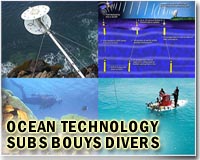 |
Washington (AFP) Feb 19, 2011 Global warming could spur the growth of toxic algae and bacteria in the world's seas and lakes, with an impact that could be felt in 10 years, US scientists said Saturday. Studies have shown that shifts brought about by climate change make ocean and freshwater environments more susceptible to toxic algae blooms and allow harmful microbes and bacteria to proliferate, according to researchers from the National Oceanic and Atmospheric Administration (NOAA). In one study, NOAA scientists modeled future ocean and weather patterns to predict the effect on blooms of Alexandrium catenella, or the toxic "red tide," which can accumulate in shellfish and cause severe symptoms, including paralysis, in humans who eat the contaminated seafood. "Our projections indicate that by the end of the 21st century, blooms may begin up to two months earlier in the year and persist for one month later compared to the present-day time period of July to October," said Stephanie Moore, one of the scientists who worked on the study. But the impact could be felt well before the end of this century -- as early as 2040, she said at the annual meeting of the American Association for the Advancement of Science. "Changes in the harmful algal bloom season appear to be imminent. We expect a significant increase in Puget Sound (off the coast of Washington state where the study was conducted) and similar at-risk environments within 30 years, possibly by the next decade," said Moore. In another study, NOAA scientists found that desert dust, which contains iron, deposited into the ocean from the atmosphere could lead to increases of harmful bacteria in the seawater. Researchers from the University of Georgia found that adding desert dust to seawater significantly stimulated the growth of Vibrios, a group of ocean bacteria that can cause gastroenteritis and infectious diseases in humans. "Within 24 hours of mixing weathered desert dust from Morocco with seawater samples, we saw a huge growth in Vibrios, including one strain that could cause eye, ear and open wound infections, and another strain that could cause cholera," said Erin Lipp, who worked on the study. The amount of iron-containing dust deposited in the sea has increased over the last 30 years and is expected to continue to rise, based on precipitation trends in western Africa that are causing desertification. Rising precipitation in some parts of the world and lack of rain in other parts has been blamed on climate change by some experts. Global warming has also been blamed for rising ocean temperatures, and "a warming ocean, which we know is happening, increases the likelihood of disease that affects both wildlife and humans," NOAA administrator Janet Lubchenco told AFP. Unhealthy oceans impact not only human and animal health but also affect countries' economies, said Lubchenco, noting that US coastal states are home to eight in 10 Americans and generated 83 percent of US GDP in 2007. Last year, Americans got a stark reminder of the key role played by marine ecosystems in their lives and livelihoods when a BP deepwater well ruptured in the Gulf of Mexico, sending millions of barrels of oil spewing into the sea waters and crippling the region's tourism and seafood industries. President Barack Obama for a $2.9 million funding increase for NOAA in his 2012 budget to establish an oil spill research and development program to provide "useful information, methods and tools for prevention, response and assessment of oil spill impacts," noted Lubchenco. NOAA also wants to consolidate its climate change services into a single office, but the Republican-controlled House of Representatives voted Saturday to slash funding to the agency, putting many of its programs in jeopardy.
Share This Article With Planet Earth
Related Links Water News - Science, Technology and Politics
 Fewer big fish in the sea, say scientists
Fewer big fish in the sea, say scientistsWashington (AFP) Feb 18, 2011 Fewer big, predatory fish are swimming in the world's oceans because of overfishing by humans, leaving smaller fish to thrive and double in force over the past 100 years, scientists said Friday. Big fish such as cod, tuna, and groupers have declined worldwide by two-thirds while the number of anchovies, sardines and capelin has surged in their absence, said University of British Columbia res ... read more |
|
| The content herein, unless otherwise known to be public domain, are Copyright 1995-2010 - SpaceDaily. AFP and UPI Wire Stories are copyright Agence France-Presse and United Press International. ESA Portal Reports are copyright European Space Agency. All NASA sourced material is public domain. Additional copyrights may apply in whole or part to other bona fide parties. Advertising does not imply endorsement,agreement or approval of any opinions, statements or information provided by SpaceDaily on any Web page published or hosted by SpaceDaily. Privacy Statement |